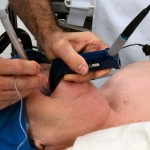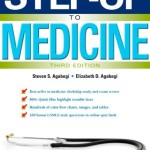As I mentioned in a previous post about how important it is to know proper scrub technique, it is equally important to know how to gown and glove. Most students will receive formal training in these techniques. However, if you are planning on being in the OR either for shadowing or elective rotations before you receive training, be sure to watch this video and the video on proper scrub technique
How to scrub for surgery, a training video
Most medical students will be required to take a crash course in scrubbing, gowning and gloving. However this may not happen until your surgery or OB rotation during third year. Many students will find their way into the ORs before those rotations. My first OR case was during a urology elective. I had no scrub training and the surgeon asked me right before the case, “Hey med student, go scrub, I need a first assistant.” I had to find a scrub tech in the hall to help me.
So, learn how to do it now! I have seen a lot of training videos, but this one is particularly good for scrubbing. I also highly recommend you see this video on gowning/gloving. You don’t want to mess that up either, the scrub nurses will kick you out.
General Surgery Animation
It’s amazing how realistic this video actually is.
Like an M4
An anthem for all 4th year medical students, courtesy of the University of South Carolina. Enjoy it while you can! A parody of Like a G-6.
Is it getting harder to match?
Yes!
With each passing year the number of applicants to US residencies increases significantly, with only a modest increase in residency positions.
Source: http://www.nrmp.org/data/Main2011.jpg
This is likely due to a number of reasons.
- There are increasing numbers of non-US students (foreign) applying to US residencies
- There are increasing numbers of US students from non US schools (usually the Caribbean)
- There are increasing numbers of medical schools opening
- Medicaid has not increased its funding for residency positions at the same rate as #1,2,3
Am I a competitive residency applicant?
This question starts to plague your mind the day you don the short white coat, and it never leaves until match day during your 4th year. Although you don’t have to decide what you want to go into until the summer of your 4th year, it is a good idea to know what you would have to do to be competitive in a difficult specialty. There are two great ways to obtain this information.
- For 3rd and 4th year students, speaking to a student-friendly advisor is a great idea. HOWEVER, beware of the nice guy. Find an attending who won’t be afraid to break your heart. Better to have it broken now, than spend thousands getting your hopes up when you really had no chance anyway.
- For first and second year students, the best resource in the world is the Outcomes of the Match materials provided by the NRMP. The document is fantastic, but it is a lot to chew. The link below is the most recent report, which summarizes the results from the 2009 match.
http://www.nrmp.org/data/chartingoutcomes2009v3.pdf
Periodically, I will be breaking down all the information provided by this document. For the time being, look it over and study the graphs. Everything you want to know about competitiveness of each specialty (not ophthalmology!) is in this document…here are a few to whet your appetite
Average Step 1 scores
Average Step 2 Scores
Average # matched applicants who were AOA
Average # or research projects
Percent of matched applicants with Ph.Ds
Where can I buy scrubs?
 Most medical schools will either provide students with scrubs, or provide a means of purchasing scrubs. However, the exchange of scrubs usually does not occur until the clinical years. Most of you will want to purchase some scrubs for gross anatomy during your first year. A simple google or eBay search will surely result in plenty of options. However, you DO NOT want to keep those scrubs after anatomy! So, here is a suggestion, go to the local thrift store and buy a pair for a couple bucks…then throw them away.
Most medical schools will either provide students with scrubs, or provide a means of purchasing scrubs. However, the exchange of scrubs usually does not occur until the clinical years. Most of you will want to purchase some scrubs for gross anatomy during your first year. A simple google or eBay search will surely result in plenty of options. However, you DO NOT want to keep those scrubs after anatomy! So, here is a suggestion, go to the local thrift store and buy a pair for a couple bucks…then throw them away.
Any thrift store close to a hospital will be teeming with used scrubs from MDs, nurses, and techs. Find your local store and stock up. Here are some helpful links for finding your closest
















 My name is Andrew and I am a first year resident training to be an ophthalmologist. I created ShortWhiteCoats to provide medical students, residents, and the public with all the information I spent so many hours looking for during medical school.
My name is Andrew and I am a first year resident training to be an ophthalmologist. I created ShortWhiteCoats to provide medical students, residents, and the public with all the information I spent so many hours looking for during medical school.







